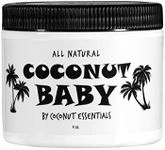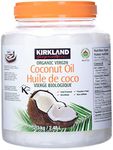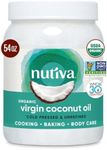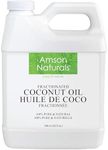Buying Guide for the Best Coconut Oil For Baby
Choosing coconut oil for your baby is an important decision, as it can be used for a variety of purposes such as moisturizing skin, treating cradle cap, or even as a gentle massage oil. When selecting a coconut oil, it's essential to focus on purity, safety, and how the oil is processed. Babies have delicate skin, so the quality and type of coconut oil you choose can make a big difference in how well it works and how safe it is for your little one.Type (Virgin vs. Refined)The type of coconut oil refers to how it is processed. Virgin coconut oil is extracted from fresh coconut meat and is minimally processed, retaining more natural nutrients and a mild coconut scent. Refined coconut oil is made from dried coconut and goes through more processing, which removes most of the scent and some nutrients. For babies, virgin coconut oil is generally preferred because it is purer and less likely to contain additives. If your baby has very sensitive skin or you want the most natural option, virgin coconut oil is usually the best choice.
Organic CertificationOrganic certification means the coconut oil was produced without the use of synthetic pesticides or fertilizers. This is important for babies because their skin can absorb chemicals more easily than adult skin. When navigating this spec, look for oils that are clearly labeled as 'certified organic.' If you want to minimize your baby's exposure to potential toxins, choosing an organic coconut oil is a wise move.
Cold-Pressed vs. Expeller-PressedCold-pressed coconut oil is extracted without using heat, which helps preserve more nutrients and the natural coconut aroma. Expeller-pressed oil uses some heat during extraction, which can slightly reduce the nutrient content and change the texture or scent. For babies, cold-pressed oil is often recommended because it is gentler and retains more beneficial properties. If you are looking for the purest and most nutrient-rich option, cold-pressed is the way to go.
Fragrance and AdditivesSome coconut oils are mixed with fragrances or other additives to enhance scent or texture. For babies, it's best to choose oils that are labeled as 'fragrance-free' and 'additive-free' to avoid potential skin irritation or allergic reactions. Always check the ingredient list to ensure the oil is 100% pure coconut oil. If your baby has sensitive skin or allergies, this is especially important.
PackagingCoconut oil can come in glass jars, plastic containers, or even squeeze bottles. Glass is generally considered safer for storing oils because it doesn't leach chemicals and helps preserve freshness. However, plastic containers are lighter and less likely to break. If you are concerned about chemical leaching or want to keep the oil as fresh as possible, glass packaging is a good choice. For travel or convenience, plastic may be more practical.














